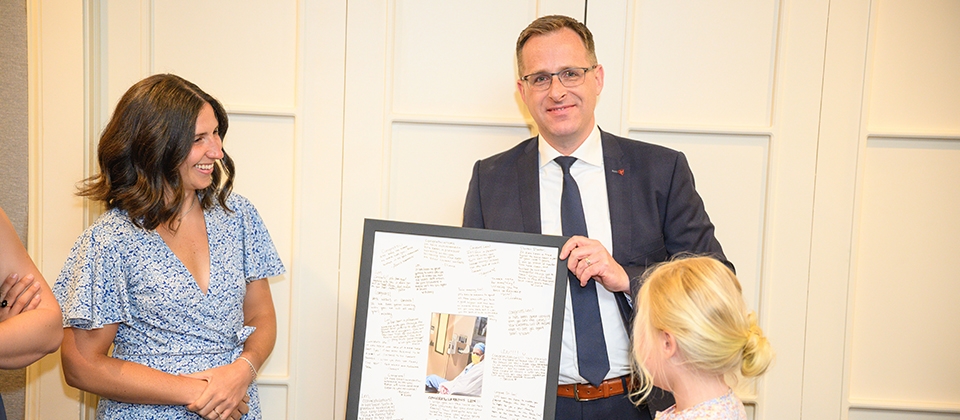Medical Resident Grad Shares 7-Year Journey of [Brains], Sweat and Tears

July 2, 2025
What does it take to get through a bachelor’s degree, medical degree, PhD, a seven-year residency and then at least a year of fellowship training?
Leonard Verhey, MD, PhD, who just graduated as Corewell Health West’s first seven-year neurosurgery resident narrows it down to one word — passion.
“You need to find something you’re interested in and look forward to going to work every day,” he said.
For Dr. Verhey, pediatric neurosurgery is that. Brains might essentially look the same during surgery, but behind each brain is a unique person.
“You’re operating on an organ that houses character, motivation, thinking, and personality, let alone more predictable functions like moving and speaking,” he said.
“And your responsibility as a neurosurgeon is to get that patient through whatever surgical procedure you’re doing, whether it’s clipping an aneurysm or taking out a brain tumor, and get them out of that surgery as close to the same person they were going in.”
That passion is why he committed to the then-brand-new residency program seven years ago. That commitment meant early mornings, late nights, time away from family dinner, bedtimes, family outings and vacations.
“Obviously, if you work like that for the rest of your career lifespan, that’s not sustainable, but it’s the means to an end in order to get to do something that you’re super passionate about that requires it,” he said. “It’s critical work that we do, and you have a finite, protected seven years to master the craft.
The neurosurgery catalyst
Dr. Verhey is a first-generation college student from Ancaster, Ontario, Canada. He first discovered his medical passion during a scary time: A tree fell on his younger sister when she was 7 years old and she sustained a significant brain injury.
After three weeks in the ICU and several months in the hospital, his sister recovered from her injury. And for Dr. Verhey, still an undergrad at the time, a spark was ignited. Captivated by the medical team’s care of his sister and communication with the family, he started shadowing his sister’s neurosurgeon and eventually applied for medical school.
Along his educational journey, he received his PhD, married his wife Lauren and they had two kids together (they now have four). While applying for residency programs, he heard then-Spectrum Health was launching a Grand Rapids neurological surgery residency, led by Kost Elisevich, MD, PhD.
Lauren is from Grand Rapids and it felt like a perfect fit.
“It was beyond exciting to realize that neurosurgery could, for one, be a reality and that secondly we’re able to do it in my wife’s hometown in a new program,” Dr. Verhey said.
A long and rewarding seven years
It’s a serious matter committing to a seven-year neurosurgery residency, and not something Dr. Verhey thinks anyone is ready for until they’re in it.
“As much as we like to say we knew what we were getting into, I don’t think we really did,” he said of him and his wife.
Dr. Verhey learned to focus on the patients and pathology instead of distractions. And suddenly, his graduation day — June 5, 2025 — was upon him.
He said it’s a “family affair” to get through a program like this and “it’s a graduation for all of us.”
After working so much and so hard for so long, it’ll take some time to sink in that the residency is over, he said. He and his family are taking vacation time in northern Michigan before heading to Canada for his fellowship in pediatric and fetal neurosurgery.
“Corewell Health has been an incredible place to be, to work, to train,” he said, and he would “absolutely” be interested in returning if a position is available after his fellowship.
A testament to Grand Rapids
Dr. Verhey said the residency program’s caliber is a testament to the people in Grand Rapids, such as Paul Mazaris, MD, who heads the program.
They help mold doctors into solid surgeons, who can handle anything from epilepsy and movement surgeries, complex spine surgeries, severe traumatic brain injuries, devastating brain tumors, hemorrhages and aneurysms.
It’s every credit to the Corewell Health training program for ensuring “we’re surgically sound, our decision making is rigorous, we care about our patients and we understand the pathologies we treat,” he said.
“Wherever we end up, we carry with us the neurosurgery we learned in Grand Rapids at Corewell Health,” Dr. Verhey said.

